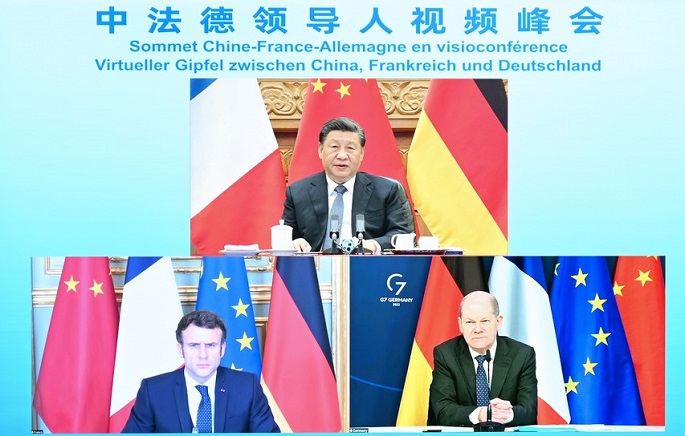Xi, Macron, Scholz discuss Ukraine situation remotely
Published : 09 Mar 2022, 04:32
Chinese President Xi Jinping had a virtual summit with French President Emmanuel Macron and German Chancellor Olaf Scholz on Tuesday, reported Xinhua.
Xi pointed out that the combined impact of major global changes and the pandemic, both unseen in a century, has brought multiple global challenges that need to be addressed through global cooperation.
Noting that China and the EU share much common understanding on promoting peace, seeking development and advancing cooperation, Xi said that we need to shoulder our responsibility to bring more stability and certainty to a turbulent and fluid world.
Xi said it is important for the two sides to enhance dialogue, stay committed to cooperation, and promote steady and sustained progress of China-EU relations.
China's development will create broader space for China-EU cooperation, Xi said, adding that the two sides must, under the principle of mutual benefit and win-win, further deepen green and digital partnerships as well as practical cooperation in various fields.
The two sides need to continue upholding multilateralism and advancing major global agenda, he added.
Macron and Scholz congratulated China on its successful hosting of the Beijing Olympic Winter Games, saying that the world faces many challenges, and each country acting on its own will only make things worse.
The European side values the important and positive role of China in global affairs, and is willing to engage in close cooperation with China to jointly tackle climate change, public health and other major global challenges, they said.
The two leaders said the European side is ready to work with China for a successful EU-China summit, and to move forward France-China, Germany-China and EU-China relations.
The leaders exchanged views on the key issue of the current situation in Ukraine.
Macron and Scholz shared their assessment and positions on the current situation in Ukraine, saying that Europe is facing the worst crisis since World War II.
France and Germany support reaching a settlement through negotiation and giving peace a chance, they noted.
The two leaders thanked China for its initiative on the humanitarian situation and said the two countries are ready to strengthen communication and coordination with China to promote talks for peace, and prevent further escalation of the situation that may worsen the humanitarian crisis.
Xi stressed that the current situation in Ukraine is worrisome, and the Chinese side is deeply grieved by the outbreak of war again on the European continent.
China maintains that the sovereignty and territorial integrity of all countries must be respected, the purposes and principles of the UN Charter must be fully observed, the legitimate security concerns of all countries must be taken seriously, and all efforts that are conducive to the peaceful settlement of the crisis must be supported, he said.
The pressing task at the moment is to prevent the tense situation from escalating or even running out of control, Xi stressed.
China commends the mediation efforts by France and Germany on Ukraine, he said, adding that China will stay in communication and coordination with France, Germany and the EU and, in light of the needs of the parties involved, work actively together with the international community.
Xi emphasized that we need to jointly support the peace talks between Russia and Ukraine, and encourage the two sides to keep the momentum of negotiations, overcome difficulties, keep the talks going and bring about peaceful outcomes.
We need to call for maximum restraint to prevent a massive humanitarian crisis, Xi said, adding that China has put forward a six-point initiative on the humanitarian situation in Ukraine, and stands ready to provide Ukraine with further humanitarian aid supplies.
We need to work together to reduce the negative impact of the crisis, Xi said, adding that relevant sanctions will affect global finance, energy, transportation and stability of supply chains, and dampen the global economy that is already ravaged by the pandemic. And this is in the interest of no one.
We need to actively advocate a vision of common, comprehensive, cooperative and sustainable security, Xi said.
China supports France and Germany in promoting a balanced, effective and sustainable European security framework for the interests and lasting security of Europe, and by upholding its strategic autonomy, he said.
China will be pleased to see equal-footed dialogue among the EU, Russia, the United States and NATO, Xi added.
News agency dpa adds: The exchange on Tuesday took place during a video call, Chinese state television reported. Scholz and Macron had sought talks with Xi to advance diplomatic efforts to end the war.
However, China stands behind its "strategic partner" Russia, as Foreign Minister Wang Yi had made clear the day before. Beijing also refuses to condemn the invasion.
In the UN Security Council, China had only abstained from voting, which France's president had nevertheless emphasized positively before the joint talks with Xi.
Speaking to the press in Beijing on Tuesday, Chinese Foreign Ministry spokesperson Zhao Lijian was rather reserved and unspecific about hopes that China, with its influence on Russia, might be able to play a mediating role.
Similar to Wang the day before, the spokesperson only said that China supports all diplomatic efforts that are conducive to a peaceful solution.
"We would like to play a constructive role in promoting peace talks, and when necessary, we are ready to work with the international community to do the mediation together with the international community," Zhao said.
Foreign experts pointed out that China, with its demonstrative support for Russia, was not neutral and therefore not suitable as a mediator.
At the same time, Chinese experts in state media rejected Chinese mediation on the grounds that the West did not trust China and would first have to stop its "vicious campaigns" against China.


